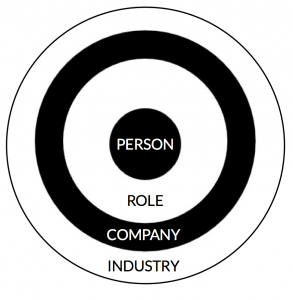
In Part 1 of this series, I shared with you why I’m passionate about learning from those with more experience than myself. One of the ways I’ve experienced growth in my own career is by making sure I act on the advice given to me by the people I look up to in life.
The leadership team at Credera is a group I’ve come to admire for the simple fact that they truly embody our core values: professionalism, excellence, integrity, and humility. I decided to put a twist on my “How do you do it?” question and ask the Partner Team at Credera, “What advice would you give to your 20-something self?”
This week I sat down with Matt Levy, David Dobat, Kevin McDonald, and Derek Knudsen.
Matt Levy, Co-Founder & Managing Director
Do the right thing, regardless of what shortcuts might appear to exist. It can be hard to do the right thing when you feel pressure to figure out a shortcut, but in reality, there is no shortcut. It all comes down to living a life of integrity. I don’t know anyone who said they did the right thing and later regretted it. But, be kind when someone makes a mistake or takes a shortcut. Each of us has to learn this lesson in our own time.
Become really good at your work. It is tempting to look for opportunities to get promoted early. But if someone takes the time to become really good at their craft and add exceptional value, this approach will benefit them their entire career. They’ll have the skills to go deep in a particular category and as a result, they will be a well-respected leader in their field. A person’s reputation for excellence will precede their promotion.
Have grit. In its simplest form, grit is pushing through obstacles and committing to put the work in that is required to be great at something. If you’ve ever played sports, the easily transferable illustration is that you can want to be good at a sport all day long and practice occasionally for a couple of hours. But until you get to the point where you’re willing to put in whatever it really takes to become great—for example, let’s say you wanted to be a great shooter in basketball, you must be willing to set and achieve the goal of not leaving the court until you make 500 shots every day—until then, it is unlikely you are practicing grit.
Surround yourself with the right people. There is a saying that you are the average of your five closest friends—it’s the idea that whoever you surround yourself with is who you’ll end up being most like. It’s all about surrounding yourself with the right kind of people inside and outside of work. Surround yourself with people you like, trust and respect.
Figure out how you are uniquely positioned to be helpful. The idea is to understand your strengths, where you are most likely to be successful and what environment will allow you to grow those strengths. This will allow you to differentiate yourself from those around you. Understanding those strengths and aligning with the profession that matches those will help you excel. Ask yourself, where do I get the most energy and where am I the most helpful? If you are energized and extraordinarily helpful at the same time, pay attention to those moments.
Stay curious. I love to learn and make it a point to take notes on what I’m reading. I find I get half the value if I’m not taking notes. This habit is something that helps me stay curious. So, be insatiably curious—take notes on what you’re reading, ask questions: How do things work, what makes people tick, why is this person interested in certain things, why do they value what they do? It’s the “why” questions that fuel curiosity.
Be a giver, not a taker. Being a giver or a taker are paths we each choose. You know when you’re riding a boat and you look behind the boat at the wake? If you look behind someone’s life, and the wake of their life is filled with generosity and lots of healthy relationships, that’s a great indicator of the boat’s effectiveness. The wake of someone’s life tells a story about the way they operate, so choose to be a giver.
David Dobat, Vice President & CFO
Don’t be fooled by the deceitfulness of wealth. What you’re doing and who you’re doing it with will matter more. When I got out of school I took a job that paid less and was broke, but I took less money because I liked the people at that company better.
Find out what you’re passionate about and do that. Life is way too short, and we spend way too much time working to not do something we are passionate about. Figure out what you’re passionate about, and do whatever it takes to make it happen.
Treat people with respect in order to maintain professional relationships. It’s important to keep up with a small network of relationships in the beginning—at some point, you can use those relationships to help others or yourself. I recently had lunch with a senior vice president that I’ve known for 15 years, but haven’t spoken with much in the last two years. He reached out and we picked up right where we left off—this should get easier as you grow in your career.
Save as much money as you can. This may be harder for some who have things like college debt, but the way to do that is to adjust your lifestyle and make it work. My wife and I did this when we first got married. We both had great jobs, but we made a decision to spend as if we only had my income and saved as much as we could. Ultimately it pays off over time.
Kevin McDonald, Vice President
Have confidence. A lot of consultants who are beginning their career are somewhat nervous and don’t have that confidence when sitting in a client meeting with executives. Early in my career I felt that same way until a mentor told me, “Look, executives and people in general put their shoes on one foot at a time.” What he meant was that I shouldn’t be intimidated because they’re human beings just like you and me. Take confidence in your experience and your point of view—be mindful of being able to articulate that thinking or experience in a succinct and executive summary type of way.
Know your client’s business. Every consultant should understand what their client does and how they make money. Know what they do and how they do it. You’ll find it’s important to have some level of understanding around this, as it will guide a lot of the day-to-day activities.
Be engaging. Early in my 20s, someone shared with me that first and foremost you have to be excellent at what you do, but beyond that don’t just have your head down in a laptop, punching keys the whole time—be engaging, be interesting, and be likeable.
Be a bullseye reader. This is something I’ve continued to do throughout my career and it has been extremely valuable. Think of your reading like a bullseye: The bullseye is the person (e.g. human being). Genuinely get to know them and their interests, and read up on those things. The next ring is their role within the company or organization—where do they fit and what are their responsibilities? Know the answers to these questions. The third ring is their company—what is their growth strategy? Their business drivers? Read up on these. The final ring is their industry—where are they relative to peers? This is a model I was taught early in my career and I use it each time I engage with a client.

Be mindful of the season of life you’re in. I learned early in my career that work and material things are important, but at the end of the day what matters is being authentic in all areas of life. We tend to compartmentalize work into one box, and family and friends into another—but really there is one box called life and it’s multidimensional. Be mindful of the season of life you’re in and invest in those, your family, spouse, and kids because those opportunities will be once in a lifetime. This concept will especially hold true as you learn to lead and serve others.
Don’t hide what isn’t going well. On one of my first projects I learned that when things don’t go well, don’t hide them. Bad news needs to be communicated early, often, and very loudly to the key stakeholders. The project’s success, delivery, and reputation is absolutely important, so if you need the help just ask.
Derek Knudsen, Vice President
Look for ways to exceed your own expectations. Always look for ways to exceed even your own expectations as that is the basis of your personal brand. Your personal brand is how the world and your peers see you. The great, highly successful leaders I’ve worked for and around always did this and it defined them and how others viewed them. Establishing this habit will pay dividends the rest of your life, both professionally and personally.
Have a destination in mind for your career and build a roadmap to get there. In our careers, each step should develop some experience or skill that will help you become the best you can be. While the destination can and likely will change as you get more and broader experiences, it is paramount to make sure the path you are going down is taking you to the right destination.
Having strong emotional and organizational intelligence are critical. Growing up in a hypercompetitive consulting environment I definitely swung the pendulum way too far to the “being better than everyone else” versus “being a better person to everyone else.” I had little appreciation for the importance of emotional and organizational intelligence, but in the professional world having strong emotional and organization intelligence are critical and become more important as your career progresses. By working on listening and communication skills, management, and leadership early on—you will be set up for future success.
I knew from the moment I stepped into the doors at Credera that this was a place where I felt at home and where I was going to experience tremendous personal and professional growth. Matt, David, Kevin, and Derek are just a few of the people at Credera that challenge me to be the best version of myself both inside and outside of the office.
If being part of a place like Credera is something that interests you, I encourage you to check out our careers page or just shoot me an email at awhite@credera.com.
Contact Us
Let's talk!
We're ready to help turn your biggest challenges into your biggest advantages.
Searching for a new career?
View job openings
